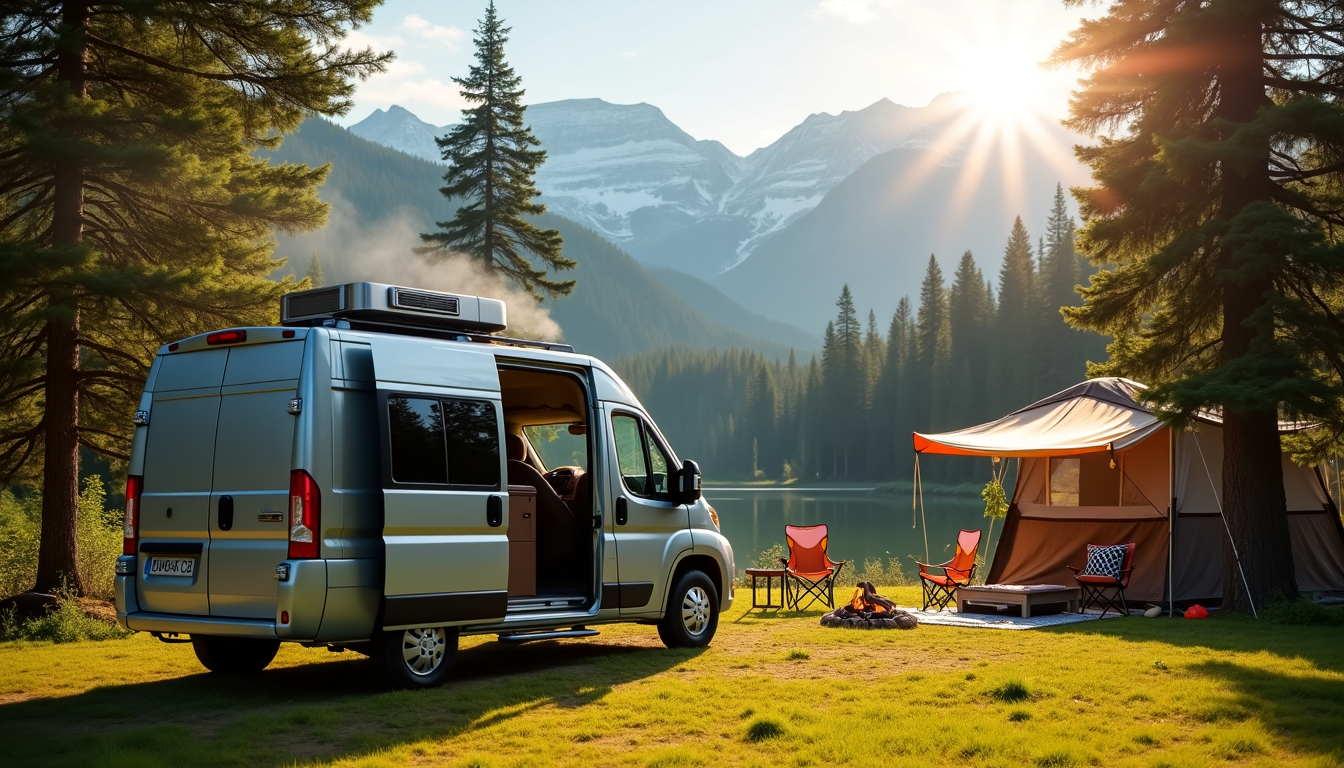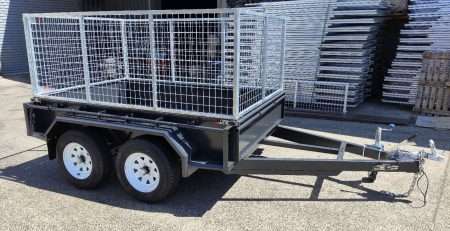
Camper Air Conditioner Review: Top Picks for 2024
Keeping cool while camping is essential for a comfortable outdoor experience. Camper air conditioners have become a game-changer for outdoor enthusiasts, offering a way to beat the heat and enjoy nature in comfort. These portable air conditioners for camper trailers and caravans provide a welcome respite from sweltering temperatures, making camping trips more enjoyable for everyone.
This article will explore the various types of camper air conditioners available, including roof top air conditioners and split system options. We’ll present our top 5 picks for 2024, considering factors such as energy efficiency, cooling capacity, and compatibility with solar panels. Additionally, we’ll discuss key considerations to help you choose the right air conditioner for your camper trailer or caravan, ensuring you stay cool on your next adventure.
Types of Camper Air Conditioners
When it comes to keeping cool in a camper, there are several types of air conditioners available. Each type has its own advantages and is suited to different camping setups. Let’s explore the main categories of camper air conditioners.
Roof-mounted units
Roof-mounted air conditioners are the most common type for campers and caravans. These units are designed to fit into a square opening in the roof, typically either 360mm x 360mm or 400mm x 400mm. The popularity of roof-mounted units stems from their practicality and efficiency.
One of the main advantages of roof-mounted air conditioners is their space-saving design. By being installed on the roof, they don’t take up any valuable interior space in the camper. This is particularly beneficial for smaller vehicles where every inch of space counts.
Another benefit of roof-mounted units is their cooling efficiency. Since cold air naturally sinks, having the air conditioner positioned high up allows for better air distribution throughout the camper. This results in more even cooling and improved comfort for occupants.
However, it’s important to note that roof-mounted air conditioners may not be suitable for all types of campers. Pop-top caravans and some smaller camper vans may not have roofs strong enough to support the weight of these units. In such cases, alternative options may be more appropriate.
Portable units
Portable air conditioners offer a flexible solution for campers who want cooling without permanent installation. These units are designed to be easily moved and can be used in various settings, including tents, camper vans, and caravans.
One of the main advantages of portable air conditioners is their versatility. Many models can be used not only for camping but also at home, in a car, or in an RV. This multi-functionality makes them a cost-effective choice for those who want cooling in different environments.
When choosing a portable air conditioner for camping, it’s important to consider factors such as power source compatibility, cooling capacity, and noise level. Look for units that can be powered by batteries, USB, or standard outlets, depending on your camping setup. A cooling capacity of around 2,000 to 4,000 BTUs is typically sufficient for small to medium-sized tents or campers.
Under-bench units
Under-bench air conditioners, also known as built-in units, are installed inside the camper, usually under a bench or in a storage compartment. These units are an excellent option for campers that can’t support roof-mounted air conditioners, such as pop-top caravans or small camper trailers.
One of the main advantages of under-bench units is their compact design. They can be installed in various locations within the camper, making them a versatile choice. Additionally, under-bench air conditioners tend to be more affordable than their roof-mounted counterparts.
However, it’s worth noting that under-bench units do have some limitations. They may not cool as efficiently as roof-mounted units since the cool air is directed from the floor upwards. They also require ducting for air distribution, which may need to be purchased separately.
In conclusion, the choice between roof-mounted, portable, and under-bench air conditioners depends on factors such as your camper’s design, your cooling needs, and your budget. By understanding the pros and cons of each type, you can make an informed decision and ensure a comfortable camping experience, even in hot weather.
Top 5 Camper Air Conditioners for 2024
### Best overall
The Dometic Ibis 4 stands out as the top choice for camper air conditioners in 2024. This well-polished unit has been developed over years to withstand the harshest Australian conditions. As the evolution of the legendary Aircommand range, including models like Sandpiper, Wren, and Cormorant, it’s no wonder the Ibis 4 has become CaravansPlus’ best-selling camper air conditioner.
Best budget option
For those seeking a cost-effective solution, the Serene Life SLPAC10 portable air conditioner offers impressive performance at an affordable price. This compact unit is ideal for smaller living spaces or bedrooms in camper trailers. In tests, it demonstrated its ability to lower the temperature from 76 to 73 degrees Fahrenheit in just 90 minutes. While it may not match the cooling power of more expensive models, its budget-friendly price and easy setup make it an attractive option for campers on a tight budget.
Best for small campers
The Webasto Cool Top Trail 24 Air Conditioner is an excellent choice for small caravans and camper trailers. This roof-mounted unit boasts a lightweight design, weighing only 29kg, making it ideal for campers where every kilogramme counts. Despite its compact size, it delivers impressive cooling and heating capacity of 2.4kW. Its low profile and energy efficiency make it a perfect fit for smaller campers with limited space and power resources.
Best for large RVs
For those with larger recreational vehicles, the Frigidaire FHPW142AC1 is the go-to option. This powerful unit boasts a coverage area of up to 700 square feet, making it suitable for spacious RVs and camper vans. With 14,000 BTU of cooling power, it can quickly chill large interiors, outperforming many other models in its class. The Frigidaire unit also features a clean air ioniser, trapping airborne particles in its washable philtre for improved air quality during your camping adventures.
Most energy-efficient
The Midea Duo stands out as the most energy-efficient camper air conditioner in our lineup. During testing, this unit used less electricity than any other model over a day-long period. Its energy efficiency doesn’t come at the cost of performance, as it managed to lower the temperature in a living space by 5 degrees in just two hours. The Midea Duo also excels in humidity control, making it an excellent choice for campers travelling to areas with high humidity levels.
When choosing a camper air conditioner, it’s essential to consider factors such as the size of your vehicle, power requirements, and specific cooling needs. Roof-mounted units like the Dometic Ibis 4 and Webasto Cool Top Trail 24 offer space-saving solutions, while portable options like the Serene Life SLPAC10 provide flexibility for different camping setups.
For those relying on solar panels and battery banks, energy-efficient models like the Midea Duo can help conserve power during extended trips. Split system air conditioners and reverse cycle units offer versatility in both cooling and heating, ensuring comfort across various climates.
As the camping and caravanning industry continues to evolve, manufacturers are developing innovative solutions to meet the diverse needs of outdoor enthusiasts. From compact units for small camper trailers to powerful systems for large RVs, there’s a camper air conditioner to suit every type of vehicle and camping style.
Key Factors to Consider When Choosing
When selecting a camper air conditioner, several crucial factors come into play to ensure you choose the right unit for your needs. Let’s explore these key considerations to help you make an informed decision.
Cooling capacity
The cooling capacity of a camper air conditioner is a vital factor to consider. It determines how effectively the unit can cool your living space. Cooling capacity is typically measured in kilowatts (kW) or British Thermal Units (BTU). As a general rule, an air conditioner with a capacity of 2kW to 2.5kW is suitable for a caravan up to 5 metres (16ft). For caravans up to 6 metres (19ft), a capacity of 2.5kW to 3kW is recommended, while larger vans up to 7.5 metres (25ft) may require 3kW or more for optimal efficiency.
Power consumption
Power consumption is a crucial consideration, especially for those planning to use their camper air conditioner off-grid. Caravan air conditioners are among the appliances that use the most power in a caravan. Running at full speed, a camper air conditioner can use about 1000 to 2000 watts of power, compared to 100 watts for a fridge or 50 watts for a fan. It’s essential to consider your power source, whether it’s caravan park power, generators, batteries, or solar panels, to ensure you have sufficient energy to run your air conditioner.
Noise levels
Noise levels can significantly impact your comfort, especially during sleep or relaxation times. When choosing a camper air conditioner, pay attention to the decibel (dB) ratings provided by manufacturers. Some units can be quite loud, with noise levels ranging from 60 to 75 dB. For reference, 75 dB is comparable to the noise level of a vacuum cleaner. If you’re sensitive to noise, consider models known for quieter operation, such as the Dometic IBIS 4, which has received positive feedback for its low noise levels.
Installation requirements
Installation requirements vary depending on the type of camper air conditioner you choose. Roof-mounted units are popular due to their space-saving design but require a structurally sound roof capable of supporting the unit’s weight. Built-in models, on the other hand, need a specific compartment or storage area inside the caravan. Consider the available space in your camper and whether you’ll need professional installation, which can add to the overall cost.
Price
The cost of a camper air conditioner can vary significantly based on factors such as brand, model, and features. In Australia, the price range for installing air conditioning in a caravan can be between AUD 1077.67 to AUD 4618.59, depending on the unit type and installation fees. When budgeting, consider not only the purchase price but also potential accessories, installation costs, and any necessary upgrades to your camper’s electrical system to support the additional power load.
When making your decision, it’s crucial to balance these factors against your specific needs and preferences. Consider the size of your camper, your typical travel destinations, power availability, and budget constraints. By carefully weighing these key factors, you can choose a camper air conditioner that provides optimal comfort and efficiency for your outdoor adventures.
Conclusion
The world of camper air conditioners has undergone significant changes, offering a wide range of options to suit different needs and preferences. From roof-mounted units to portable solutions, there’s now a cooling system for every type of camper and camping style. The top picks for 2024 showcase the industry’s progress in developing efficient, powerful, and user-friendly air conditioners that can withstand the rigours of outdoor adventures.
When choosing a camper air conditioner, it’s crucial to weigh factors such as cooling capacity, power consumption, noise levels, and installation requirements against your specific needs. By carefully considering these aspects, you can find a unit that not only keeps you cool but also enhances your overall camping experience. Remember, the right air conditioner can make a world of difference, turning your camper into a comfortable oasis even in the hottest weather. ## FAQs
1. How long can I expect a camper air conditioner to last?
The lifespan of a typical RV air conditioner usually ranges between five to fifteen years, depending on various factors including usage and maintenance.
2. Are 12V air conditioners effective in RVs?
Yes, 12V air conditioning systems can operate efficiently using your van’s leisure batteries, allowing you to maintain a cool environment in your RV even in remote areas without shore power. These units are generally more compact and simpler to install, which is ideal for the confined spaces within a motorhome.
3. What common issues could affect my RV air conditioner?
Common problems with RV air conditioners include airflow issues such as frozen evaporator coils, clogged coils, dirty air philtres, and incorrect fan speed settings. These issues can lead to warm air being emitted from the ceiling vents. It’s advisable to regularly inspect the plenum or dam area of your RV by removing the overhead ceiling cover where the return air philtre and/or controls are housed.
4. What is the typical lifespan of a portable air conditioner?
Portable air conditioners generally last between 5 to 10 years. In comparison, residential single whole-home AC units can last up to 15 years, central air-source heat pumps about 15 to 25 years if well-maintained and housed in a well-insulated home, and ductless mini-split AC systems (heat pumps) up to 20 years.
Author
I am Rahatul Ashiq Tamal. Another author of Muscle Trailers. Muscle Trailers is a well-known trailer brand in Sydney, Melbourne & Adelaide

How to Mount a Spare Tire on Your Trailer: A Simple Step-by-Step Guide
Trailer service centers receive over 1 million phone calls and 1.3 million emails each year about trailer maintenance problems....

How to Fix RV Roof Leaks: Simple Roof Leak Detection Guide for Beginners
Did you know DIY RV roof repairs can cost under $50? But undetected leaks could lead to substantially higher repair...

Starting a Food Truck Business in Australia: From Trailer Selection to Launch
The Australian mobile food market has evolved into a billion-dollar industry. This makes a food truck...
